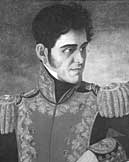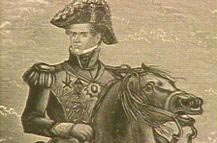Antonio Lopez de Santa Anna
Santa Anna's Cloud of Suspicion
A conversation with Miguel Soto
Universidad Nacional Autónoma de México
 Antonio López de
Antonio López de Santa Anna
Which political groups were interested in bringing Santa Anna back to Mexico, and why?
The political groups that brought back Santa Anna were basically the moderates and the puros. They were the groups of liberal federalists who thought that the best thing for the country was a federal system of government, but they were at odds about how to establish such a system, and especially about how to distribute property, particularly the property of the church. These puros and moderados joined forces to overthrow President Mariano Paredes and arranged for Santa Anna's return. They attempted to use him as they had in the early 1830s to unify the public and the political forces to achieve their goals, but with no greater success. The alliance of puros and moderados during the war only lasted long enough to get rid of Paredes. As soon as they accomplished that, they continued to fight among themselves.
Why did Santa Anna want to return?
Because he saw himself as the eternal savior of the nation. When the puros, moderados and others called for him, he had to come back. He had to save the country, and at the same time to try to control all sides for his own political advantage. This was what Santa Anna set out to do.
In reality, he returned under a cloud of suspicion. People were not sure what he might have offered the Polk government in Washington. What had he been willing to sacrifice, they asked, in order to reach an agreement with the U.S.? Was he just putting on an act, trying to impress political and influential groups to show that he was making a serious military effort, when his real intention was to pressure Congress to sign a peace treaty with the U.S. in order to avoid worse consequences for Mexico? His behavior fueled doubt and concern among the different political groups, but the ongoing antagonism and conflicts between them made it necessary for them to depend on Santa Anna throughout the war.
How did the outcome of the battles contribute to suspicions about Santa Anna?
From my point of view, talking strictly in military terms, Santa Anna's performance was a case of way too many errors. To me they seem excessive. One can make one mistake, or several, but all of the time? That's too much. So there are very serious doubts about Santa Anna's performance. As soon as he returned from exile, he ordered troops to abandon Tampico and Monterrey rather than defend those cities. The officers at Tampico obeyed. The general in Monterrey did not. Then there was the famous withdrawal from La Angostura when Santa Anna was about to win the battle against Taylor. And, later the time he refused to go to Valencia's aid at Padierna when it could have meant a victory over Scott's forces. There were other moments, however, when he mobilized troops with no rhyme or reason. Yet, here was a man who acted heroically, who did not avoid the dangers or the bullets. At La Angostura his horse was shot out from under him. He ordered another horse and continued to command his army.
.How did the distrustful relationship between Santa Anna and the Mexican Congress affect their behavior?
After the military defeat suffered at Cerro Gordo and the arrival of the U.S. Army in Puebla, Santa Anna tried to explore the possibility of an agreement with the U.S. representative, Nicholas Trist. But, Santa Anna did not want to do this by himself. He asked members of Congress if they would be willing to recognize and authorize his efforts, but Congress answered that first he should carry out the negotiations. Then they would reserve the power to determine whether those negotiations would be valid or not. What did that mean? That neither Santa Anna nor Congress was willing to run the political risk alone. Neither one wanted to make a decision without the support of the other in case things turn out poorly.
The inability to make a decision of such magnitude was very revealing of the political situation in Mexico. Nobody was willing to run the risk of something that they feared already was lost. For that same reason there was no Congressional declaration of war against the U.S. government because everybody knew that the war was going to be lost. And nobody wanted to take that political responsibility.
What happens to the cloud of suspicion?
Events overwhelmed it. I believe that Santa Anna played the cards he had in his hand. They were not enough. He could not control what happened. Things got away from him. The way in which the military campaign unfolded was so catastrophic, and the fighting among the political groups — in which he was a participant— was so divisive that any consensus became impossible. What he did not count on was to the extreme to which everyone would let the situation go before they did pull together. The capital, the city of Mexico, had to be conquered by the U.S. Army and the government had to cease to function and be reconstructed in Querétaro. It took all of this before the political groups in Mexico were willing to sit down and sign a peace treaty. When Santa Anna saw this, he left. He did not want to be present because he knew the political cost involved. I think that he would have liked to reach an agreement with the Americans, but he wasn't able to, so he left.
How do you explain Santa Anna and his career?
Undoubtedly, Santa Anna's personality is a reflection of the country's political and social conditions. The enormous instability, the fragile and ephemeral character of the alliances, of attitudes toward authority and government, explain how someone like Santa Anna, who was attacked and defeated at the end of 1844 was able to make a comeback by the summer of 1846. His return illustrates the degree of political fragmentation in Mexico. It's clear, however, that Santa Anna is only one of a number of people who took advantage of these conditions. Sometimes I think he was not even the most important character, but he received the most attention because he survived, he prevailed the greatest number of times.
 Rather than see Santa Anna as a dictator, I view him as a man who was eternally aspiring to power. He was a great opportunist, a pragmatist, always looking for allies, for people with whom he could make deals. Yet, he never was able to create an enduring base of power, and if Santa Anna couldn't do it, then I think no one could during this period.
Rather than see Santa Anna as a dictator, I view him as a man who was eternally aspiring to power. He was a great opportunist, a pragmatist, always looking for allies, for people with whom he could make deals. Yet, he never was able to create an enduring base of power, and if Santa Anna couldn't do it, then I think no one could during this period.
Today the majority of Mexicans think that Santa Anna gave away territory to the U.S. by signing the peace treaty, but he was not even in the country when the treaty was signed. I believe he would have liked to have been present and to have been able to capitalize on the situation, to use the treaty to his political advantage. But that was not the case. He was out of the country by then, but not for long.
As a result of the war, the vacuum of authority became so profound that Santa Anna grasped at one more opportunity to rule. In 1853 he was invited back by many politicians, if not the majority. When he took office, he gave himself the name "His Serene Highness," and endowed himself with the authority to not only rule for the rest of his life, but also to name his successor. Even though he was only able to hold on to power for two years, the fact he was allowed to lead the country again is indicative of the crisis in Mexico in the middle of the nineteenth century.






